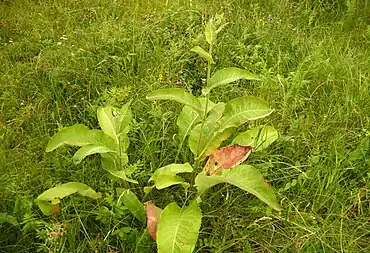< Reconstruction:Proto-Slavic

Reconstruction:Proto-Slavic/omanъ
Proto-Slavic

*omanъ – Inula helenium
Etymology
From *omaniti (“to bewitch”), for ascribed protective witchery, its vegetable pungency, and its medicinal potency, fulfilling the role of the Arnica montana in the Germania.
Declension
Declension of *omanъ (hard o-stem)
| singular | dual | plural | |
|---|---|---|---|
| nominative | *omanъ | *omana | *omani |
| genitive | *omana | *omanu | *omanъ |
| dative | *omanu | *omanoma | *omanomъ |
| accusative | *omanъ | *omana | *omany |
| instrumental | *omanъmь, *omanomь* | *omanoma | *omany |
| locative | *omaně | *omanu | *omaněxъ |
| vocative | *omane | *omana | *omani |
* -ъmь in North Slavic, -omь in South Slavic.
Descendants
- East Slavic:
- South Slavic:
- West Slavic:
References
- Georgiev, Vladimir I., Duridanov, I. V., editors (1995), “ома̀н”, in Български етимологичен речник [Bulgarian Etymological Dictionary] (in Bulgarian), volumes 4 (мѝнго² – па̀дам), Sofia: Prof. Marin Drinov Pubg. House, →ISBN, page 870
- Theißen, Ulrich (2006) ““Ein bezauberndes Hustenkraut”: Zu den Bezeichnungen des Alants (Inula helenium L.) in den slawischen Sprachen, vor allem im Bulgarischen”, in Zeitschrift für Balkanologie, volume 42, pages 228–237
This article is issued from Wiktionary. The text is licensed under Creative Commons - Attribution - Sharealike. Additional terms may apply for the media files.